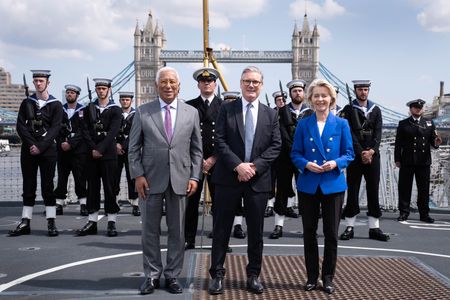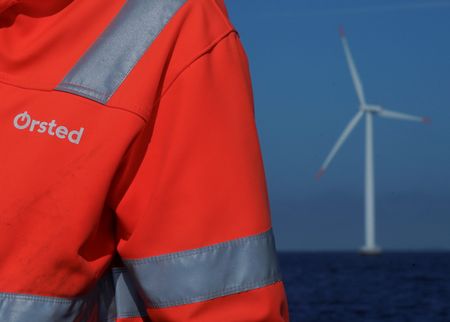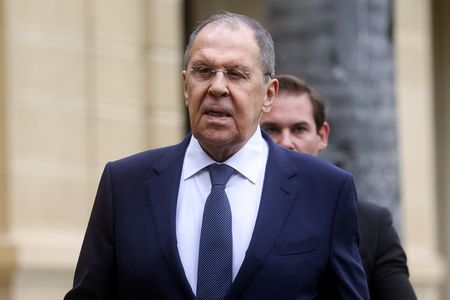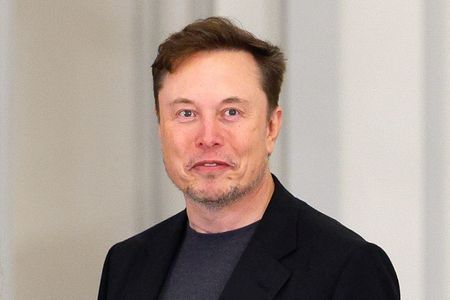By Kate Holton, Andrew MacAskill and Alistair Smout
LONDON (Reuters) -Britain’s pursuit of trade deals with the European Union and United States, while courting China, has made it a test case for navigating U.S. President Donald Trump’s unpredictable new world order.
A historically open nation, reliant on global commerce, Britain has secured several trade accords since Trump’s sweeping tariffs unleashed a trade war.
It negotiated a free trade deal with India, tariff relief from Washington and repositioned itself closer to the European Union on defence, energy and agriculture.
The approach has tested the patience of the United States, China and the EU, three major trade powers that make up two-thirds of Britain’s trade, and any limited economic benefits are likely to take time to emerge, analysts say.
Martin Donnelly, formerly the chief civil servant in Britain’s trade ministry, said there were no “easy or cheap wins” in the current environment and the government risked “being shut out by the three big trade blocs” if it gets the strategy wrong.
In a fragmented world, trade analysts said Britain had accepted its role as a satellite in the United States’ security and tech orbit, giving Washington oversight of some supply chains and steel ownership that could squeeze out China.
It fended off U.S. demands for increased access to its food markets so it could align itself more closely with Brussels, with that deal eased by the EU’s desire for tighter military ties with Britain.
It is also trying to improve ties with China: to secure inward investment and consumer goods, to sell its financial services to China’s elite, while trying to avoid sharing sensitive technologies that could anger the United States.
Marco Forgione, head of the Chartered Institute of Export & International Trade, said some of the 80,000 British businesses that export were already restructuring supply chains to ringfence high-risk sectors, including defence and AI.
“They need a strategy that works with all major markets,” he said, adding that an approach that deals with the EU, U.S. and China differently across sectors made sense, “but only if our partners see it as coherent and not opportunistic”.
One trade official, who has worked in London and Brussels, said Britain had extracted concessions from Trump that the U.S. president would be unwilling to give to Europe, and that it had also accepted a satellite status that would likely be anathema to Brussels.
The official, who asked not to be named due to his government work, said the challenge ahead was to keep all partners on side.
TORTUOUS POST-BREXIT NEGOTIATIONS
Britain became an independent trading nation in 2020 after four years of tortuous negotiations following its vote to leave the EU.
Advocates of Brexit had said it would free the country to strike trade deals with faster growing economies in Asia.
Proponents also wanted it to build on the strong security ties Britain had with the U.S., to incorporate greater trade in food and goods, but that failed to materialise.
Britain’s budget forecaster believes the post-Brexit weakening of trade will lead to the economy’s potential productivity being 4% smaller after 15 years than it would have been if it had remained in the bloc.
Weighed down by 2.8 trillion pounds ($3.7 trillion) of debt and with an economy that is struggling to grow, it seeks alliances to deliver growth, and security in a more uncertain world.
Paul Drechsler, who is on the board of the UK’s business and trade department and has led companies in Britain and abroad, said the recent deals would help to build trust.
“It’s just such an important time, both in terms of geopolitics, but also in terms of the economy globally, we need to do things that will get trade going,” he said.
Britain became the first country to get a reduction in U.S. tariffs when it announced a limited deal with Trump to lower levies on cars and steel, but it retained the baseline 10% U.S. tariff, despite having balanced trade with the United States.
Janka Oertel, director of the Asia programme at the European Council on Foreign Relations, said that would have angered the EU, Japan and others that wanted a united front against Trump.
That U.S. deal could also be a challenge to ties with China, especially given security clauses on steel that give the U.S. the potential to exclude China from the British steel industry.
Starmer’s government has made improving ties with China one of its main foreign policy goals since it was elected last July, after successive Conservative governments sparred with Beijing over human rights, Hong Kong, investment and security concerns.
A spokesperson for the Chinese embassy in London said agreements between countries should not target other nations and that China was prepared to respond “as necessary”.
Oertel said Britain could find itself in an awkward situation if China goes “very hard on the UK to scare others into not signing on to these agreements”.
“What the UK has managed to do is kind of make itself the guinea pig,” she said, “and I’m not sure that’s a comfortable position to be in.”
($1 = 0.7479 pounds)
(Writing by Kate Holton; editing by Barbara Lewis)








